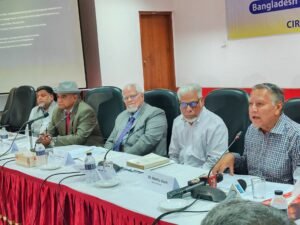Press Release
Welcome Address of Dr. CAF Dowlah, Chair, BIPS, at the Seminar on “Constitutional Reforms for Transition to Democratic Governance,” held on October 19, 2024 at CIRDAP Auditorium, Dhaka, Bangladesh.
Ladies and Gentlemen, Good Morning.
It is my distinct pleasure to welcome you to the seminar on “Constitutional Reforms for Transition to Democratic Governance,” organized by the Bangladesh Institute of Policy Studies (BIPS).
This seminar marks the first public endeavor of the BIPS, and with this modest step we announce our presence within the intellectual and policy discourses of Bangladesh.
We are honored to have Honorable Justice M. A. Matin with us, a distinguished retired judge of the highest court of the country, with impeccable expertise on adjudication of constitutional matters, to present keynote speech at the seminar.
We are fortunate to have Honorable Justice Syed M. Dastagir Husain as Chair of the session today. Retired Justice Dastagir Husain has been a champion of human rights and a former President of the Bangladesh Chapter of Amnesty International.
We are also very proud to have with us the distinguished Editor of The Daily Star, Mr. Mahfuz Anam Esq., as our Guest of Honor. We salute him for standing the ground, proudly and forcefully, during the dark period when there existed no semblance of press freedom in the country.
At BIPS, we are guided by a deep commitment to market-oriented and democratic principles, and shaping pragmatic public policies for sustainable development of Bangladesh.
As an independent, non-profit think tank, we seek to engage in collaborations with other like-minded think tanks, institutions, and individuals, both within the country and abroad.
Our policy research and advocacy aims at enhancing economic resilience, financial stability, human rights, and the legal and judicial reforms necessary to support a robust democratic framework of governance in Bangladesh.
We intend to create a Global Platform for Researchers who are addressing issues central to the development of Bangladesh. We request them to make their contributions available on our website.
Today’s seminar addresses one of the most pressing issues facing our nation: Constitutional reforms needed for making a transition to a system of democratic governance.
This topic has gripped the nation’s attention for many years, and has come to the forefront once again since the “JULY REVOLUTION” that toppled one of the most brutal autocratic regimes in the contemporary world.
We gratefully remember heroic sacrifices made by our younger generation for delivering a “Second Liberation” to the brutally tortured and inhumanly belittled nation that helplessly cried for rescue for many years.
We are proud of them, and we extend our fullest support and cooperation to the materialization of their hopes, dreams, and aspirations.
We also wish all the best to the Interim Government led by Professor Yunus in its efforts to make the transition to democratic governance. We hope the interim government will be able to do so as soon as possible, and as smoothly as possible.
First, Insert a Due Process Clause in the Constitution, like the Magna Carta of Great Britain, and the Fifth and Fourteenth Amendments of the U.S. Constitution, to make sure that:
No citizen can be deprived of life, liberty, or property without proper legal procedures.
Nobody can be arrested from their homes or properties without a court order.
Police is restricted to arrest only when individuals are actively involved in the acts of committing a crime.
The authority to file cases with the courts removed from the Police and transferred to state-appointed attorneys. And,
Ordinary citizens are protected from biased and dishonest prosecutors and judges.
Second, Switch to a Presidential Form of Government to ensure proper separation of powers and checks and balances between the executive, legislative, and judicial branches.
A presidential system, like that of the U.S., is best suited for true separation of powers and checks and balances.
A parliamentary system, on the other hand, is not well-suited for this purpose as the Prime Minister serves as the Leader of the Parliament as well as the Chief Executive of the country.
In case the parliamentary system is continued, the reforms should aim at strengthening the separation of powers between the branches of government to prevent any Prime Minister from exercising unchecked authority or infringing on the powers of other branches of government.
The reforms must also provide adequate safeguards to implement checks and balances so that violations of constitutional provisions can be promptly subjected to parliamentary oversight and judicial scrutiny.
Third, Empower the President with Emergency Powers to dissolve Parliament, and appoint an interim, caretaker, or national government, in times of national emergencies and general elections, without requiring any consent or advice of the Prime Minister.
Fourth, Establish a legal framework for a truly independent judiciary, by bringing all courts under the jurisdiction of the Supreme Court of Bangladesh. At the same time, subject the judiciary to public and media scrutiny to ensure its accountability.
Fifth, Adopt a bicameral legislature so that the Upper House approves legislative and budgetary proposals of Lower House, provides consents to appointments of all top-level officials, including High Court and Supreme Court judges, and ratifies all treaties.
Sixth, Adopt a federal structure of government by upgrading existing Divisions into Provinces, and placing them under elected Governors. This will take the government near to people, and substantially and significantly deter rise of autocratic regimes in the future.
Seventh, Declare Freedom of Expression as an inalienable right of citizens, like the First Amendment of the U.S. Constitution, to guarantee that all citizens can speak freely, and the Press can exercise the freedom of expression without fear or favor.
Eighth, establish a truly independent Election Commission, equipped with the power and authority to hold free and fair elections, and operate totally free from any external interference.
Nineth, impose appropriate term limits for the President, Prime Minister, Members of Parliament, judges of the High Court and Supreme Court, and so on.
Tenth, allow Floor Crossings, so that the members of parliament can cross party lines without the risk of losing their seats in order to defend national interest.
The interim Government has a historic responsibility, and a grand opportunity, to fundamentally reform the constitution.
Regrettably, while the nation has been clamoring for genuine constitutional reforms for making a transition to democratic governance, the Interim Government’s approach seems to be deeply flawed.
Unfortunately, the Constitutional Reform Commission is headed by a political scientist, while reforming the supreme legal document of the nation—the supreme law of the land—deserves capable leadership of a highly distinguished legal expert/scholar.
Before finishing, please allow me to extend my sincere thanks and gratitude to you all for taking the time to join our seminar today.
Your presence here emboldens our commitment to address our nation’s pressing issues.
We look forward to your continued support to our future endeavors.
I now request Honorable Justice M. A. Matin to kindly present his keynote speech.
Thank you all, once again.

BIPS Press Release on the Seminar on “Constitutional Reforms for Transition to Democratic Governance.”
Press Release on Seminar on “Constitutional Reforms for Transition to Democratic Governance,” organized by the Bangladesh Institute of Policy Studies, held on October 19, 2024

BIPS Seminar on Constitutional Reforms for Transitioning to Democratic Governance, October 19, 2024. CIRDAP Auditorium, Dhaka.
Welcome Speech:
Dr. CAF Dowlah
Chair, Bangladesh Institute of Policy Studies
Keynote Speaker:
Mr. Justice M. A. Matin
Former Judge of the Appellate Division, Bangladesh Supreme Court
Special Guests:
Mr. Mahfuz Anam, Editor, The Daily Star
Excellency Ms. Helen LaFave, American Embassy, Bangladesh
Chair:
Justice Syed Muhammad Dastagir Husain
Former Judge of High Court Division, Bangladesh Supreme Court
Designated Discussants:
Dr. Sheikh Hafizur Rahman Karzon
Chair, Department of Law, Dhaka University
Dr. Uttam Kumar Das
Advocate, Bangladesh Supreme Court
Advocate Golam Mostafa
Advocate, Bangladesh Supreme Court and Administrative Director, BIPS

Commentary on Interim Government: CRAFTING A PRAGMATIC PATHWAY TO DEMOCRATIC GOVERNANCE
Bangladesh now basks in a moment of euphoria—a new generation, resolute and unyielding, rose against the grip of an exceedingly oppressive and autocratic regime. Their sacrifice and courage, marked by the shedding of blood in unimaginable proportions, awakened the conscience of the world, and garnered spontaneous and unwavering support from every corner of the nation.
Under the unstoppable force of this popular uprising, the autocrat, who once seemed invincible, was compelled to flee abroad as a barefaced coward who abandoned millions of her followers to face the righteous fury of newly liberated people.

CALL FOR RESEARCH FELLOWS, SENIOR RESEARCH FELLOWS, AND DISTINGUISHED RESEARCH FELLOWS
Bangladesh is poised to ascend as a prominent developing nation on the global platform in the coming years. The Bangladesh Institute of Policy Studies (BIPS) is committed to facilitating this transition by formulating pragmatic public policies meticulously designed to reinforce essential elements of economic resilience, financial stability, educational progression, legal, judicial, and administrative reforms, and other fundamental intellectual frameworks crucial for the sustainable development of the nation.
Synopsis of the keynote speech of Justice MA Matin on
‘CONSTITUTIONAL REFORMS FOR TRANSITION TO
DEMOCRATIC GOVERNANCE’
CIRDAP Auditoirum, Dhaka. Organized by Bangladesh Institute for Policy Studies (BIPS) on October 19, 2024.
The Constitution of a country is generally designed to be permanent. The paradigm of an ideal constitution is ever-changing with the change of time and the needs of the people. Our founding fathers gave us a constitution in 1972, which was subjected to 17 amendments to date but has proved to be incapable of serving as the Supreme law of the land through which the sovereign authority of the state can be effectively exercised. After a successful ‘Student-People Revolution,’ the present Interim Government of Bangladesh is engaged in constitutional reforms for transition to democratic government and hence BIPS has arranged this seminar to express our thoughts on the matter.
At the very outset, what is a constitution? The Black’s Law Dictionary, Eighth Edition defines a constitution as under- “The Fundamental and organic law of a nation or state that establishes the institutions and apparatus of government, defines the scope of governmental sovereign powers, and guarantees individual civil rights and civil liberties.”
The author of ‘A Treatise on the Constitutional Limitations,’ Thomas M Cooley as early as 1868 defines a constitution as under- “That body of rules and maxims in accordance with which the powers of sovereignty are habitually exercised.”
While elaborating he quoted a famous quote from Hamilton v. St. Louis County Court, which runs as under-
“What is a constitution, and what are its objects? It is easier to tell what it is not than what it is. It is not the beginning of a community, nor the origin of private rights; it is not the fountain of law, nor the incipient state of government; it is not the cause, but consequence, of personal and political freedom; it grants no rights to the people, but is the creature of their power, the instrument of their convenience. Designed for their protection in the enjoyment of the rights and powers, which they possessed before the constitution was made, it is but the framework of the political government, and necessarily based upon the pre-existing condition of laws, rights, habits, and modes of thought. There is nothing primitive in it: it is all derived from a known source. It presupposes an organized society, law, order, property, personal freedom, a love of political liberty, and enough of cultivated intelligence to know how to guard it against the encroachment of tyranny. A written constitution is in every instance a limitation upon the power of the government in the hands of agents; for there never was a written republican constitution which delegated to functionaries all the latent powers which lie dormant in every nation, and are boundless in extent, and incapable of definition.”
The 9th amendment of US constitution explains the people’s sovereignty which runs as under-
“The enumeration in the Constitution, of certain rights, shall not be construed to deny or disparage others retained by the people.”
It is now an admitted proposition that the existing constitution in Bangladesh has been, in the language of Thomas M. Cooley, swept away by the whirlwind of a successful revolution. Therefore, the Students- People Revolution in Bangladesh that has ousted the government of Sheikh Hasina compelling her to resign and leave the country has the legitimate authority to exercise their sovereignty either adopting part of the existing constitution or writing out an altogether new constitution that may reflect their paradigm of the constitution they dreamt of.
The question is if the Students and People had the right to revolt against the government and if they have the right to amend or rewrite a constitution. John Locke defended the right of revolution in ‘Two Treatises of Government’ in this way-
“Whenever the Legislators endeavor to take away, and destroy the Property of the People, or to reduce them to Slavery under Arbitrary Power, they put themselves into a state of War with the People, who are thereupon absolved from any farther Obedience, and are left to the common Refuge, which God hath provided for all Men, against Force and Violence. Whensoever’s therefore the Legislative shall transgress this fundamental Rule of Society; and either by Ambition, Fear, Folly or Corruption, endeavor to grasp themselves, or put into the hands of any other an Absolute Power over the Lives, Liberties, and Estates of the People; By this breach of Trust they forfeit the Power, the People had put into their hands, for quite contrary ends, and it devolves to the People, who have a Right to resume their original Liberty.”
History testifies that such rights were exercised in Great Britain in 1688 when the British parliament deposed James II and made William III as their king on new conditions regarding their rights. The same view was asserted in the ‘Declaration of Independence’ by Thomas Jefferson when he wrote in 1776-
“Whenever any form of government becomes destructive of these ends, it is the right of the people to alter or to abolish it, and to institute a new government, laying its foundation on such principles, and organizing its powers in such form, as to them shall seem most likely to effect their safety and happiness.”
This legal philosophy of Jefferson was the gist of the jurisprudence of Plato, Aristotle, Cicero, Bracton, John Locke, Hume, Rousseau, Coke, Blackstone and Thomas Paine. The people of the United States not only revolted against the king of England but also after a bloody war of independence gave themselves a new constitution in 1787.
Therefore the Students and the People of Bangladesh who brought about the downfall of the government of Sheikh Hasina through the ‘July Revolution,’ had the legitimate right to revolution and are entitled to institute a new government laying its foundation on such principles, and organizing its powers in such form, as to them shall seem most likely to effect their safety and happiness. So they have the right to adopt the existing constitution or amend it suitably according to their needs or rewrite a new constitution.
State Religion
If the constitution is to be written afresh then the following articles of the constitution may be deleted: – article 2A- this article was inserted in the constitution by Act XXX of 1988. The original constitution of 1972 did not have any provision making Islam the state religion. This was done by the Martial Law regime of Hussain Muhammad Ershad. By the 15th Amendment, this was retained by the Hasina government in the present form. Neither the Ershad government nor Awami League government incorporated religion in the constitution with any noble purpose. This was to misguide the people that they did it for the sake of Islam. It was only to catch votes by befooling the people. Secondly, it was in gross violation of the judgment of the Supreme Court in the 15th amendment case where there was no condoning of the tempering of the secular nature of the constitution as done by the Martial law regime. Thirdly, the State is an institution and institutions cannot have any religion. Fourthly it militates against the equality clause in the constitution.
Portrait of Sheikh Mujibur Rahman and his fatherhood
The next article is 4A in respect of the portrait of Sheikh Mujibur Rahman. Earlier the portrait of the President was to be preserved in the offices. Now the present article declares Sheikh Mujibur Rahman as the father of the Nation and makes it mandatory to preserve and display the portrait of Sheikh Mujibur Rahman in all-important
offices. A nation may have a national leader or founder of the country but he cannot be the father of the nation. Moreover, the Holy Quran declared that Prophet Ibrahim (SM) is the father of the Muslims in the following verse-Verse no 78 of 22-
He has chosen you, and has
Imposed no difficulties on you
In religion, it is the religion
Of your father Abraham.
It is He Who has named
You Muslims, both before
And in this (Revelation)
